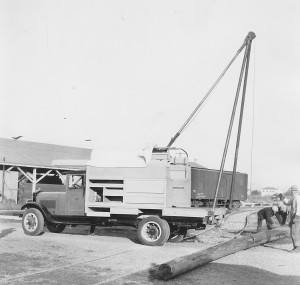
Hot tap crews for San Joaquin Light and Power Corp. in 1936. SJL&P was controlled by PG&E and had its own company union. IBEW 1245 Archive
While the National Labor Relations Board considered UE’s charge that PG&E subverted the union election, Howard Brillhart continued promoting the company union throughout the PG&E system. He kept careful records of where he went and who he met with.
On June 14, 1939 the NLRB voided the 1937 election and ordered PG&E to post notices in the workplace that it would “cease and desist” from interfering with employees’ efforts to unionize. PG&E General Manager P. M. Downing told the NLRB: “We advise you the company does not intend to post any notices of cease and desist, pursuant to your order.”
On March 28, 1941 the United States Ninth Circuit Court of Appeals affirmed that PG&E must cease and desist from interfering with its employees’ efforts to organize a union. For Downing, the Court’s ruling was just another day at the office. He ignored it. In fact, by now PG&E was even operating a second company union on properties it had taken over from San Joaquin Light and Power in 1939.
But then Howard Brillhart offered to give his meticulous records about PG&E’s illegal company union to the IBEW, which used Brillhart’s damning information to file new charges with the NLRB. Armed with Brillhart’s overwhelming evidence, the NLRB secured an agreement from PG&E to disband its company union.
On April 18, 1941, IBEW chartered a new local to organize PG&E workers: Local 1245. Brillhart easily won election as the new local’s first president.